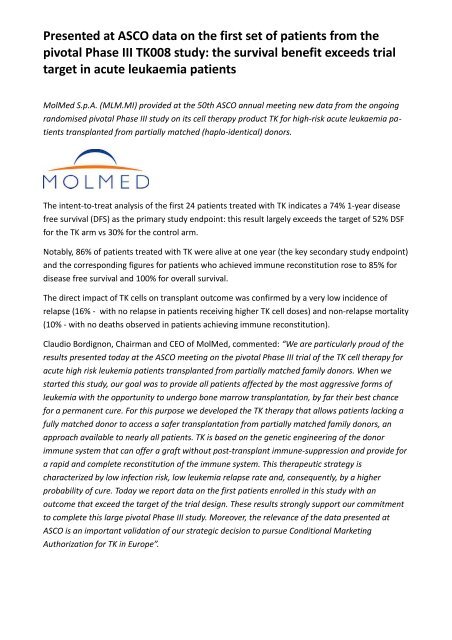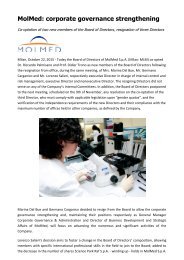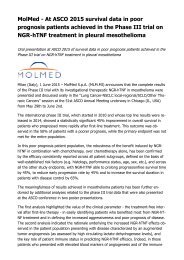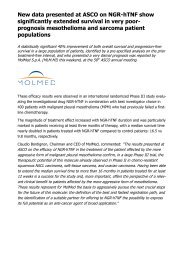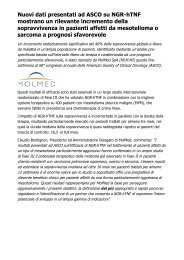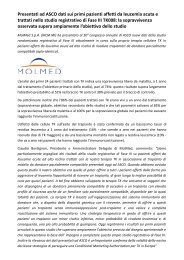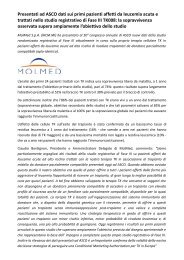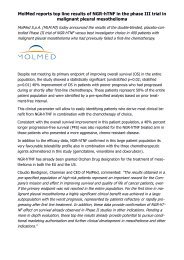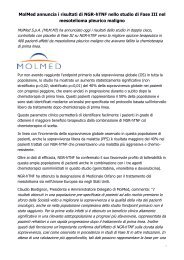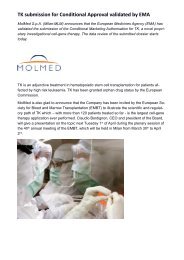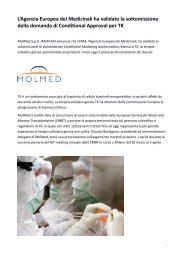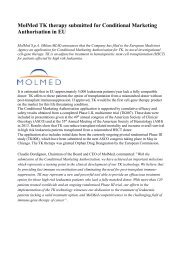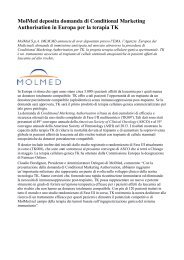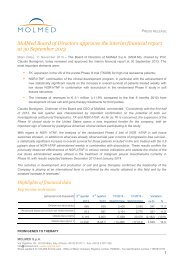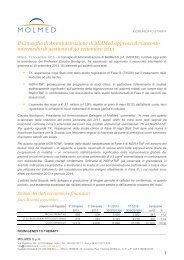MolMed TK Leukemia: ASCO new data from the Phase III study TK008
MolMed S.p.A. (MLM.MI) provided at the 50th ASCO annual meeting new data from the ongoing randomised pivotal Phase III study on its cell therapy product TK for high-risk acute leukaemia patients transplanted from partially matched (haplo-identical) donors.
MolMed S.p.A. (MLM.MI) provided at the 50th ASCO annual meeting new data from the ongoing randomised pivotal Phase III study on its cell therapy product TK for high-risk acute leukaemia patients transplanted from partially matched (haplo-identical) donors.
Create successful ePaper yourself
Turn your PDF publications into a flip-book with our unique Google optimized e-Paper software.
Presented at <strong>ASCO</strong> <strong>data</strong> on <strong>the</strong> first set of patients <strong>from</strong> <strong>the</strong><br />
pivotal <strong>Phase</strong> <strong>III</strong> <strong>TK</strong>008 <strong>study</strong>: <strong>the</strong> survival benefit exceeds trial<br />
target in acute leukaemia patients<br />
<strong>MolMed</strong> S.p.A. (MLM.MI) provided at <strong>the</strong> 50th <strong>ASCO</strong> annual meeting <strong>new</strong> <strong>data</strong> <strong>from</strong> <strong>the</strong> ongoing<br />
randomised pivotal <strong>Phase</strong> <strong>III</strong> <strong>study</strong> on its cell <strong>the</strong>rapy product <strong>TK</strong> for high-risk acute leukaemia patients<br />
transplanted <strong>from</strong> partially matched (haplo-identical) donors.<br />
The intent-to-treat analysis of <strong>the</strong> first 24 patients treated with <strong>TK</strong> indicates a 74% 1-year disease<br />
free survival (DFS) as <strong>the</strong> primary <strong>study</strong> endpoint: this result largely exceeds <strong>the</strong> target of 52% DSF<br />
for <strong>the</strong> <strong>TK</strong> arm vs 30% for <strong>the</strong> control arm.<br />
Notably, 86% of patients treated with <strong>TK</strong> were alive at one year (<strong>the</strong> key secondary <strong>study</strong> endpoint)<br />
and <strong>the</strong> corresponding figures for patients who achieved immune reconstitution rose to 85% for<br />
disease free survival and 100% for overall survival.<br />
The direct impact of <strong>TK</strong> cells on transplant outcome was confirmed by a very low incidence of<br />
relapse (16% - with no relapse in patients receiving higher <strong>TK</strong> cell doses) and non-relapse mortality<br />
(10% - with no deaths observed in patients achieving immune reconstitution).<br />
Claudio Bordignon, Chairman and CEO of <strong>MolMed</strong>, commented: “We are particularly proud of <strong>the</strong><br />
results presented today at <strong>the</strong> <strong>ASCO</strong> meeting on <strong>the</strong> pivotal <strong>Phase</strong> <strong>III</strong> trial of <strong>the</strong> <strong>TK</strong> cell <strong>the</strong>rapy for<br />
acute high risk leukemia patients transplanted <strong>from</strong> partially matched family donors. When we<br />
started this <strong>study</strong>, our goal was to provide all patients affected by <strong>the</strong> most aggressive forms of<br />
leukemia with <strong>the</strong> opportunity to undergo bone marrow transplantation, by far <strong>the</strong>ir best chance<br />
for a permanent cure. For this purpose we developed <strong>the</strong> <strong>TK</strong> <strong>the</strong>rapy that allows patients lacking a<br />
fully matched donor to access a safer transplantation <strong>from</strong> partially matched family donors, an<br />
approach available to nearly all patients. <strong>TK</strong> is based on <strong>the</strong> genetic engineering of <strong>the</strong> donor<br />
immune system that can offer a graft without post-transplant immune-suppression and provide for<br />
a rapid and complete reconstitution of <strong>the</strong> immune system. This <strong>the</strong>rapeutic strategy is<br />
characterized by low infection risk, low leukemia relapse rate and, consequently, by a higher<br />
probability of cure. Today we report <strong>data</strong> on <strong>the</strong> first patients enrolled in this <strong>study</strong> with an<br />
outcome that exceed <strong>the</strong> target of <strong>the</strong> trial design. These results strongly support our commitment<br />
to complete this large pivotal <strong>Phase</strong> <strong>III</strong> <strong>study</strong>. Moreover, <strong>the</strong> relevance of <strong>the</strong> <strong>data</strong> presented at<br />
<strong>ASCO</strong> is an important validation of our strategic decision to pursue Conditional Marketing<br />
Authorization for <strong>TK</strong> in Europe”.
<strong>MolMed</strong> has been investing on <strong>the</strong> <strong>TK</strong> cell <strong>the</strong>rapy that represents today <strong>the</strong> largest clinical<br />
experience of immuno-gene <strong>the</strong>rapy of tumours worldwide. This extensive program was carried<br />
out through <strong>the</strong> implementation of a centralised manufacturing in a single facility for global<br />
distribution. This experience, coupled with <strong>the</strong> <strong>new</strong> facilities built by <strong>MolMed</strong>, represent today an<br />
ideal platform for all <strong>new</strong> technologies of tumour immune-gene <strong>the</strong>rapy based on <strong>the</strong> different<br />
strategies of genetic engineering of <strong>the</strong> immune system.<br />
The Company would like to thank all patients and <strong>the</strong>ir families who placed confidence in this <strong>new</strong><br />
technology and all <strong>the</strong> investigators <strong>from</strong> all transplantation centres who participate <strong>the</strong> <strong>Phase</strong> <strong>III</strong><br />
trial and who contributed to <strong>the</strong> previous studies.<br />
<strong>TK</strong>008 is coordinated by Dr. Fabio Ciceri, M.D. <strong>from</strong> <strong>the</strong> San Raffaele Scientific Institute, principal<br />
investigator of <strong>the</strong> trial who illustrated <strong>the</strong> results at <strong>ASCO</strong> and commented: “Initial results of <strong>the</strong><br />
<strong>Phase</strong> <strong>III</strong> <strong>study</strong> indicate that in haploidentical transplant recipients <strong>TK</strong>-cell infusions abate nonrelapse<br />
mortality and leukemia relapse by providing a fast immune recovery in a dose-dependent<br />
manner. HSV-<strong>TK</strong> suicide gene machinery effectively and timely controlled <strong>the</strong> graft-vs-host disease<br />
(GvHD) in 100% of affected patients with no requirement for long-term immune-suppressive<br />
treatment. Results obtained so far appear largely superior to <strong>the</strong> outcomes reported by large EBMT<br />
surveys for <strong>the</strong> two treatment options of <strong>TK</strong>008 control arm: T-cell depleted and T-cell replete<br />
followed by high-dose cyclophosphamide. These results are of particular relevance in light of <strong>the</strong><br />
more accessible standard option represented by haploidentical transplants.”<br />
About <strong>TK</strong><br />
<strong>TK</strong> is a cell <strong>the</strong>rapy product, based on <strong>the</strong> use of genetically engineered donor T cells carrying a<br />
“suicide gene”. These cells are administered to patients during <strong>the</strong> haematopoietic stem cell<br />
transplantation for <strong>the</strong> treatment of high risk leukaemia. <strong>TK</strong> <strong>the</strong>rapy allows to eliminate <strong>the</strong> posttransplant<br />
immunosuppression treatment thus accelerating <strong>the</strong> immune reconstitution and<br />
controlling <strong>the</strong> immunological consequences arising <strong>from</strong> <strong>the</strong> genetic differences with <strong>the</strong> donor,<br />
known as Graft versus Host Disease (GvHD).<br />
In virtue of this approach, HSCT <strong>from</strong> partially compatible donors is a safer and more effective
option, thus potentially increasing <strong>the</strong> number of candidates for transplantation.<br />
Based on <strong>the</strong> efficacy and safety <strong>data</strong> and on <strong>the</strong> Orphan Drug designation, <strong>the</strong> Company filed a<br />
request for Conditional Marketing Authorisation of <strong>TK</strong> with <strong>the</strong> European Medicine Authority in<br />
March 2014.<br />
<strong>TK</strong>008 <strong>study</strong><br />
<strong>TK</strong>008 is a pivotal randomised <strong>Phase</strong> <strong>III</strong> trial (<strong>TK</strong>008) in adult patients affected by high-risk<br />
leukaemia undergoing transplant of haematopoietic stem cells collected <strong>from</strong> partially compatible<br />
(haploidentical) family donors. The trial compares <strong>the</strong> outcome of haplo-transplants with or<br />
without <strong>TK</strong> add-backs, with a 3:1 randomisation ratio in favour of <strong>the</strong> <strong>TK</strong> arm.<br />
The primary <strong>study</strong> end-point is disease-free survival (DFS) - which includes both transplant-related<br />
mortality and disease relapse - evaluated on 170 patients. The <strong>study</strong> is powered to detect an<br />
increase in 1-year DFS <strong>from</strong> 30% in <strong>the</strong> control arm to 52% in <strong>the</strong> experimental arm. Secondary<br />
end-points include overall survival, reduction of transplant-related mortality, safety and patients’<br />
quality of life.<br />
With <strong>the</strong> aim to provide additional clinical benefit to patients and to significantly increase <strong>the</strong><br />
potential participation of centres in <strong>the</strong> trial, <strong>the</strong> Company implemented in 2012 two important<br />
changes in <strong>the</strong> protocol design of <strong>Phase</strong> <strong>III</strong> trial <strong>TK</strong>008. The first consists in broadening <strong>the</strong><br />
enrolment criteria to include patients in leukaemic relapse, in addition to those in disease<br />
remission; <strong>the</strong> second change provides for <strong>the</strong> introduction of a fur<strong>the</strong>r treatment option in <strong>the</strong><br />
control arm, based on <strong>the</strong> use of an unmanipulated transplant followed by cyclophosphamide<br />
administration during <strong>the</strong> post-transplantation period.<br />
This press release is written in compliance with public disclosure obligations established by<br />
CONSOB (Italian securities & exchange commission) resolution no. 11971 of 14 May 1999, as<br />
subsequently amended.<br />
About <strong>MolMed</strong><br />
<strong>MolMed</strong> S.p.A. is a biotechnology company focused on research, development and clinical validation<br />
of novel anticancer <strong>the</strong>rapies. <strong>MolMed</strong>’s pipeline includes two antitumour <strong>the</strong>rapeutics in clinical<br />
development: <strong>TK</strong>, a cell-based <strong>the</strong>rapy enabling bone marrow transplants <strong>from</strong> partially compatible<br />
donors, in absence of post-transplant immune-suppression, in <strong>Phase</strong> <strong>III</strong> in high-risk acute<br />
leukaemia; NGR-hTNF, a novel vascular targeting agent, in <strong>Phase</strong> <strong>III</strong> in malignant pleural meso<strong>the</strong>lioma<br />
and in <strong>Phase</strong> II in six more indications: colorectal, lung (small-cell and non-small-cell), liver<br />
and ovarian cancer, and soft tissue sarcomas. <strong>MolMed</strong> also offers top-level expertise in cell and<br />
gene <strong>the</strong>rapy to third parties to develop, conduct and validate projects <strong>from</strong> preclinical to <strong>Phase</strong> <strong>III</strong><br />
trials, including scale-up and cGMP production of clinical-grade viral vectors, and manufacturing of<br />
patient-specific genetically engineered cells. <strong>MolMed</strong> is headquartered at <strong>the</strong> San Raffaele Biomedical<br />
Science Park in Milan, Italy. The Company’s shares are listed on <strong>the</strong> main market (MTA) of<br />
<strong>the</strong> Milan Stock Exchange. (Ticker Reuters: MLMD.MI)<br />
FONTE: <strong>MolMed</strong>.com


